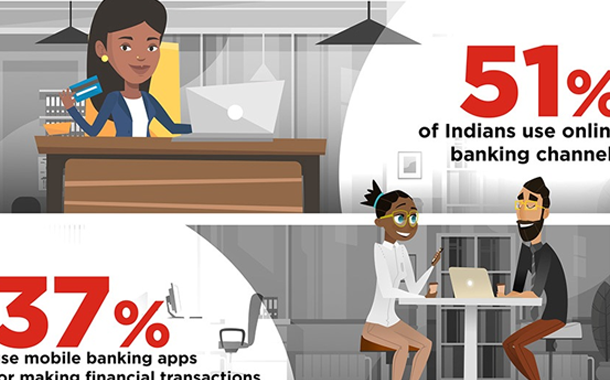Customers in India more likely to use mobile banking apps than counterparts in UK, UAE and Australia, according to survey from Avaya
Indian consumers prefer a digital-first approach to accessing banking services, only talking to a banking adviser by phone for more complex issues, according to a new survey from Avaya. Indian customers are also more likely to use a mobile banking app than their counterparts in the UK, Australia, and the UAE – and they are also more likely to complain about bad service to friends and family, and on social media.
The ‘Customer Experience in Banking’ survey, commissioned by Avaya and conducted by research company YouGov, queried more than 5,000 consumers across the four countries. More than one in four, 26%, of Indian customers prefer to access services via their bank’s website, and the same number would prefer to use a mobile app rather than talk to a human agent, compared to just 19% in Australia, 21% in the UK, and 24% in the UAE. Regardless of the channel used to contact the bank, the most important factors for Indian customers are to have issues resolved on the first point of contact, and to receive the same level of experience and service.
Getting the customer experience right is important, with 37% of respondents saying they would change banks after a bad experience, second only to the UAE. Indian consumers are also more likely to voice their complaints than in any of the other countries surveyed; one in four would share their bad experience on social media, compared to just 15% in the UK, while 44% would let friends and family know about their issues. Gratifyingly, satisfaction levels are higher than elsewhere, at 93%, with the UAE lowest at 83%. This is despite the fact that 32% of respondents in India said they have been kept waiting on the phone for lengthy periods, more than any other country surveyed, and just 22% saying they haven’t experienced any customer service issues, the lowest in all four countries.
Indian banking customers are also keener to be contacted by their bank than those in the other countries. While just 58% wanted to be alerted about a problematic or possibly fraudulent transaction, the second lowest, almost half, 49%, want to be alerted that their credit card is up for renewal, the highest of all four countries. Further, 47% want to receive information on a new launch or service, compared with just 10% in the UK, while 44% want to receive personal offers.
Virtual Financial Advisors (VFAs) – representatives from the bank who engage customers through virtual means and service them remotely with online tools – could be the solution for Indian customers, based on the perceived benefits cited by respondents. The most valued benefits of having a VFA were seen as being able to get faster resolutions of their banking inquiries regardless of the contact channel they use, receiving notifications, and a service personalized to respondents’ financial profile.
Vishal Agrawal, Managing Director, India and SAARC, Avaya said, “With India being on the tip of digital revolution, organizations need to digitally transform to meet the ever-increasing demands of their customers and banking is one of the sectors leading the way. Today, customers use varied touch points to access services, be it mobile app, website, contact center or physical visit to a branch. This has emphasized banks to focus more on an Omni-channel strategy in order to deliver the superior experiences their customers expect – and demand. Customers today are looking for elevated and seamless services, and if they don’t get them, they will look elsewhere. Hence, banks needs to equip themselves with next-generation technology solutions, which will help resolve customer problems in real-time, optimize the way agents interact with them, and deliver actionable insights to enhance customer experience.”




